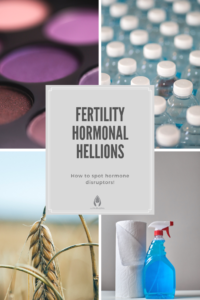“Hormonal Hellions: 5 Common Hormone Disruptors in Your Home” myMindBodyBaby
Bursting out into tears for no apparent reason.
Craving chocolate like it’s your job.
Simultaneously wanting to hug and punch your partner.
Any of these sound familiar?
Hormones. We all have them (and need them) but for some, the swings hormones can cause are enough to drive you insane.
Plus, outside of the mood swings and cravings, you have bloating, acne, constipation, tenderness, sweating and the list keeps on going. What gives?!
Chemical messengers.
Hormones are signals sent out by our endocrine system that tell each part of the body what to do. For those of us ladies in the reproductive years, hormones tell our body when to ovulate and when to have a period (if the egg wasn’t fertilized). When these things don’t happen when and how they are supposed to, the most likely culprit is an imbalance somewhere in the hormonal chain.
When it all goes sideways.
While PMS jokes can be timely and often funny, unfortunately for some, hormonal imbalance is a serious issue that if not dealt with can create bigger problems.
One of those problems can be infertility.
More women in Canada are diagnosed with infertility than Breast cancer and Alzheimer’s disease. Globally this amounts to over 50 million people who struggle, and while not all these cases are related to hormonal imbalance, many are.
Why?
I asked myself this question over and over again while struggling for 2 years with infertility. Thank goodness, research is also asking the same questions.
According to the Mayo Clinic in about 1/3 of infertility cases there is an issue with the male, 1/3 of the time an issue with the female and in the remaining 1/3 of the cases, there is a problem with both the male and female or no cause can be identified.
For men, these issues can include overexposure to environmental factors like pesticides, cigarette smoke, certain medications, heat and alcohol.
For women, common causes of infertility include ovulatory disorders (including hormonal disorders like PCOS and thyroid disease), blockages or damage to tubes, low egg reserve, endometriosis, and abnormalities with the cervix and or uterus.
In both cases, you will notice that hormonal disruption (coming from a variety of sources) can be a part of the core problem when it comes to infertility. So, let’s dive into 5 common household sources of hormonal disruptors and what you can do about them.
Top 5 Hormonal Hellions
Personal Care Products.
Have you ever look at the ingredient list on your shampoo bottle? Same goes for antiperspirants, face cleansers, make up (and so many more). These products are chalk full of hard to pronounce hormone disrupting hellions. It’s time to ditch these duds asap!
Why should you care?
These substances are known as endocrine disruptors and have been linked to a variety of health concerns like reproductive issues, thyroid issues, energy metabolism, glucose control and more. According to the UK’s Breastcancer.org, “an endocrine disruptor is any chemical that can interfere with normal hormone functions in humans or animals. While there are naturally occurring types found in plants, such as soy (known as phytoestrogens), most endocrine-disrupting compounds come from synthetic chemicals and can be avoided.”
Instead, why not make your own face cleanser and body butter! These recipes will allow you to customize your scent and eliminate any toxic chemicals found in conventional products!
23]
Conventionally Grown Produce.
Unfortunately we live a toxic world and this doesn’t exclude our food. Conventional growing practices use pesticides and herbicides to control unwanted pests of all types and unfortunately this is having an impact on our health.
While too numerous to mention all, many of these chemicals are wreaking havoc on our hormones including testosterone and thyroid and also affecting brain development and fertility.
Instead, consider buying organic produce and be sure to check out the Environmental Working Group (EWG) shoppers guide that will help you identify those fruits and vegetables that have the highest and lowest concentrations of pesticide residues.
Stress.
Although this is not a tangible item you can replace to create a greener home environment, I wanted to include it as a reminder of how detrimental an affect stress can have on our hormones.
When we encounter a stressful situation, our body attempts to adapt to this stressor by altering certain hormonal levels. This includes cortisol and thyroid hormones. This is a built in survival mechanism we all posses and need. However, prolonged exposure to stress can lead to far reaching consequences for our endocrine systems. Issues like poor glycemic control and thyroid disease are just a few.
Supporting stress levels is absolutely integral for maintaining good health, and there is no one tactic that works for all. Here 3 strategies I share with my clients (other than exercise and good nutrition habits):
- Circle and Bloom guided meditation. We love this for any type of stress but definitely those related to fertility challenges. According to them, “Meditation works by helping you to slow down and focus, to disregard worry and get in touch with the mind-body connection—your thoughts and emotions can control your physiology.” Click here for free mental well-being tools you can get started with right away!
- Say ‘no’. Period. Too much on our plates can lead to feelings of stress and anxiety. Like Lyndsey, I love making and checking things off my list. However, I learned the hard way years ago to listen to my body. Making peace with accomplishing a little less in order to save my sanity has done wonders for my stress levels. This, I believe, needs to be a conscious decision we each need to make on a daily basis.
- While not for everyone, I LOVE this not only for stress but also as an adjunct to your fertility treatments. Studies are showing that acupuncture can help improve menstrual health and coping with delayed pregnancy and smaller studies showing its impact on ‘female reproductive functioning”.
Plastics and Canned Goods.
A joint landmark study entitled “ State of the Science of Endocrine Disrupting Chemicals”, conducted by The World Health Organization and The United Nations Environment Program reported on some of the most common endocrine disrupting chemicals. In this report culprits like PCB’s, phalates and Bisphenol-A have been associated with serious (fertility-related) health problems. These health issues include prostate cancer in men, non-descended testes in young males, and thyroid cancer. According to the research “Effects on these systems can lead to obesity, infertility or reduced fertility…”
This is major news for those who still are using plastics to store, wrap, cool and heat their foods. Going forward, simple adjustments like buying and storing foods in glass, and looking for BPA free canned goods will drastically help reduce your toxic burden.
Taking it one step further, make sure any baby toys and cups/dishes etc are BPA free. Also replacing your vinyl shower curtain with one made from fabric is important. You can also make and store your own personal care products to avoid or reduce the use of plastics altogether.
Cleaning Products.
As a self proclaimed clean freak, I pride myself in always having things spick and span. However, I am very aware of the products I use in the house. Even before my daughter I was in the habit of making my own cleaning products. Now with her in the house, I’m even more conscious of keeping my home as toxin free as possible.
There are many ways we are facing exposure to toxins. Toilet cleaners, multipurpose cleaning solutions, that blue window cleaner, bleach, shower mildew solutions and the list goes on. Lucky for you, I have a SUPER simple option that I have been using for years that will eliminate the need for most of these chemicals.
Vinegar.
I’m talking about the extra strength stuff you can buy at your local hardware store. Mix this with equal parts water, and add in your favourite (and pure) lemon essential oil. The result – simple, toxin free multipurpose surface cleaner. I use this on floors (hardwood too), toilets, counters, glass and windows!
Let’s be real here, toxins are all around us – in the air we breathe, the clothes we wear to the food we eat. Some sources estimate that humans face exposure to upwards of 10,000 chemicals in a lifetime. Yikes! So it’s up to us to educate and protect ourselves accordingly. A good first step – home made face wash and whipped body butter!
23]




